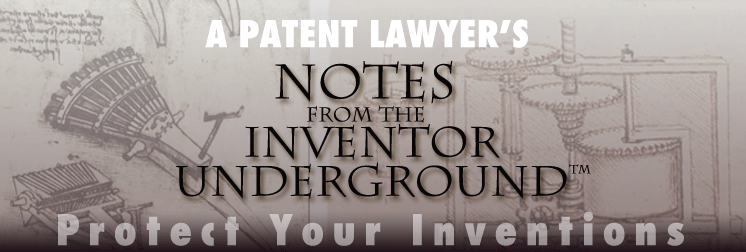Notes from the Inventor Underground

Protect Your Intellectual Property — Review Your Assignment Agreements Now
Patent and Technology trial lawyer Stan Gibson discusses the importance of choosing the right language of assignment in order to assure ownership of intellectual property that is created in the future.
A number of recent Federal Circuit decisions have highlighted the importance of assignment clauses in the transfer of intellectual property, particularly patents. These cases often distinguish between an agreement to assign in the future or the current assignment of intellectual property that may be created in the future. Although the distinction in language is minor, the outcome of who owns the intellectual property created in the future is not. Choose the wrong language of assignment and you may find that you do not own the intellectual property that is created in the future.
The recent Federal Circuit decision in Abraxis Bioscience, Inc. v. Navinta LLC, Case No. 2009-1539 (Fed. Cir. Nov. 9, 2010), highlights the necessity of reviewing assignment clauses now to make sure future intellectual property rights are preserved and protected. In Abraxis, the parties went through three years of litigation and a trial on the merits, in which the district court found that the defendant infringed the patents at issue, only to have the Federal Circuit reverse on the ground that the plaintiff, Abraxis, did not have standing to pursue the infringement action because it did not own the patents at issue at the time the complaint was filed.
What went wrong for the plaintiff?
The chain of assignments of the patents at issue. In 2006, Abraxis entered into an asset purchase agreement that contained a "Further Assurances" clause, providing that the Seller would execute "any and all further . . . assignments . . . as necessary to . . . vest in Buyer [Abraxis] any of the Transferred Intellectual Property." On the day the action was filed, the Seller obtained the assignment of the patents at issue from two related entities. This assignment occurred several months after the asset and purchase agreement was executed. Eight months after the lawsuit was filed, the Seller executed a separate Intellectual Property Assignment Agreement that assigned the patents at issue to Abraxis.
At the district court, the defendant challenged that Abraxis did not own the patents at issue at the time of the filing of the complaint. As all of the parties on the Abraxis side of the transaction intended Abraxis to own the patents (as evidenced by, among other things, the Further Assurances clause), the district court found that the intent of the various Seller entities was sufficient to imply a nunc pro tunc assignment based on the relationship between the corporate entities. The Federal Circuit–after three years of costly litigation on the merits–disagreed.
In reversing the district court, the Federal Circuit began by noting that "[a]lthough state law governs the interpretation of contracts generally . . . the question of whether a patent assignment clause creates an automatic assignment or merely an obligation to assign is intimately bound up with the question of standing in patent cases. We have accordingly treated it as a matter of federal law." Applying federal law, the Federal Circuit then noted that the wording of the assignment itself is dispositive and "[w]hether an assignment of patent rights in an agreement is automatic or merely a promise to assign depends on the contractual language itself." This is a critical distinction in federal law–as set out by the Federal Circuit–that can be dispositive of ownership issues.
For example, if a contract expressly conveys rights in future inventions, e.g., the language states that all rights and future rights are hereby assigned, then no further act is required once an invention comes into being and the transfer of title occurs immediately by operation of law. In contrast, language stating that the party "agrees to assign" is not effective to assign future inventions and instead is only a mere promise to assign rights in the future. This language is not an immediate transfer of the interests in the intellectual property and requires a subsequent act of assignment.
Applying this reasoning, the Federal Circuit concluded that the Further Assurances clause was a mere promise to assign in the future and could not automatically transfer the patents. Thus, the assignment to the Seller on the day the lawsuit was filed did not provide Abraxis with the patents on that day. Instead, the assignment was not effective until eight months later when the additional assignment document was executed by the Seller. The Federal Circuit held that Abraxis was required to have legal title to the patents on the date the lawsuit was filed and that this requirement could not be met retroactively. Accordingly, Abraxis lacked standing and the action had to be dismissed.
This case is yet another wake up call for the review of assignment agreements. Given the Federal Circuit’s ruling in this case and others (including the Stanford v. Roche, 583 F.3d 832 (Fed. Cir. 2009) case, now pending before the United States Supreme Court), the language of promising to assign in the future should be eliminated in favor of the immediate assignment language, e.g., "hereby do assign" to avoid the problems presented by the mere promise to assign in the future language, e.g., "agree to assign." Not only should forms be changed for form assignments, but past agreements, including employment agreements, should be reviewed, modified and re-executed if necessary to avoid the costly lesson learned the hard way by Abraxis.
To view a representative list of Stan’s patent and technology cases, click here.
 Los Angeles Real Estate Litigation Lawyer Jeffer Mangels & Mitchell LLP Home
Los Angeles Real Estate Litigation Lawyer Jeffer Mangels & Mitchell LLP Home

